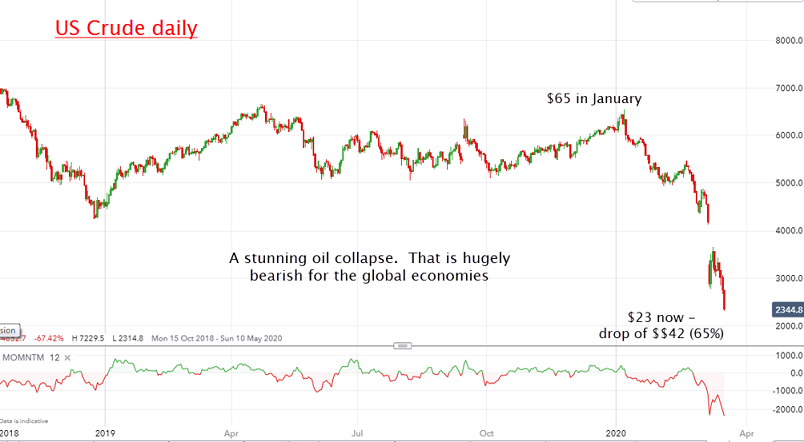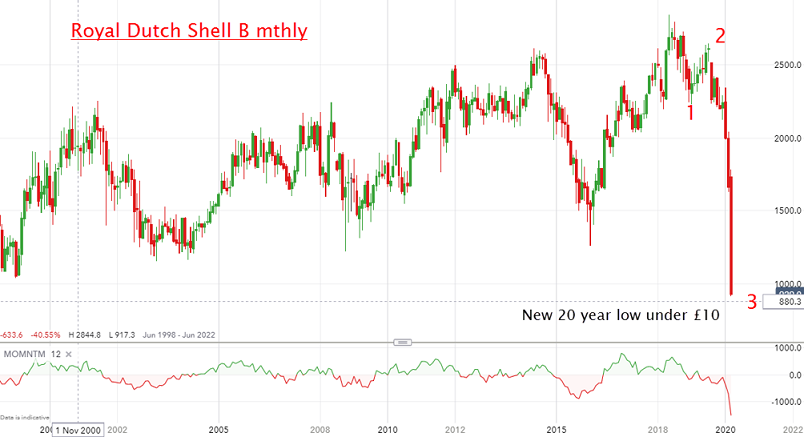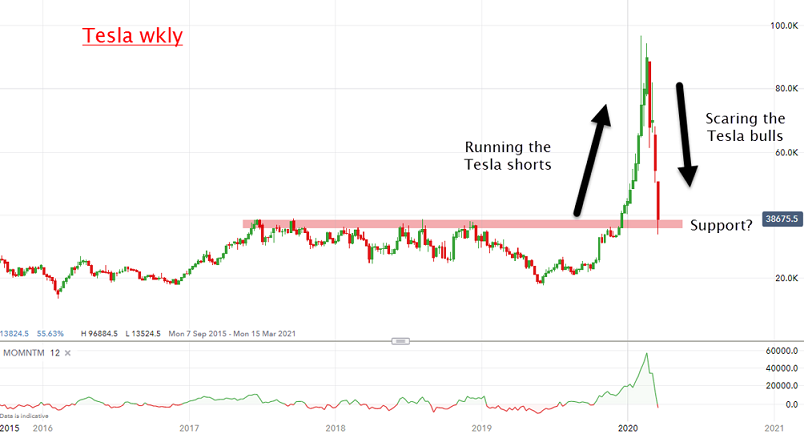Chart of the week: New forecasts for oil, Tesla and Shell
The world has changed forever, argues this trader, and the old rules no longer necessarily apply.
20th March 2020 09:27
by John Burford from interactive investor
The world has changed forever, argues this trader, and the old rules no longer necessarily apply.

How often in our lifetimes have we experienced such a radical about-face of public mood?
And in my estimation, this is only the beginning. My December prediction for 2020 to be a bear year has been fully vindicated, but I had no idea the almost universal collapse in values would be so brutally swift.
The dramatic events of the past few weeks in the markets has stunned even a confirmed bear such as myself. Imagine: US Crude oil has collapsed from $65 in January to a current $23 – a loss of 65% in two months. Here is the amazing chart:

Source: interactive investor Past performance is not a guide to future performance
These are prices not seen since 2011. The sheer speed of the collapse is stunning – and has caught many investors in the oil majors, such as Shell (LSE:RDSB), completely off-guard.
That is, unless they heeded my bearish warnings a few weeks ago.
And this rapid collapse signals one thing: we are entering a global deflationary phase. Here is the Shell chart:

Source: interactive investor Past performance is not a guide to future performance
Shell has just made a new 20-year low under £10. The wave labels are pretty clear–we are in a very extended third wave down. When it terminates, I expect a bounce in wave 4 and then move to new lows in wave 5, with crude oil moving possibly to the $12 range.
And that bounce could well coincide with the current bounce in the FTSE 100 off my previously cited 5,000 target zone (low to date is 4,850).
I know many investors are anxious to buy Shell very much on the cheap as the juicy 15% dividend must be very hard to resist. But that dividend was set last year and with oil now significantly weaker than in 2019, who knows if they will cut the dividend this year and by how much?
Remember, the old rules no longer necessarily apply now that we are in the Virus Age, and the company’s history of not cutting the dividend must be put into question, especially now when fuel consumption is dropping fast.
Of course, with oil at around the $10 area in prospect, auto companies will continue to take huge hits with mass lay-offs. Not only that, but the infant electric revolution will be stopped cold dead.
The leading light in this sector has been Tesla (NASDAQ:TSLA) and from its all-time high last month at almost $1,000, it has plunged to the $360 area – a loss of 64% (incidentally, matching the drop in crude oil in a deliciously ironic twist of fate)

Source: interactive investor Past performance is not a guide to future performance
But with oil (and natural gas) at hugely competitive prices, can the heavily subsidised electric vehicle and ‘renewable’ power industry survive much longer when government funds are urgently required elsewhere?
Sterling is already plunging in anticipation. In a strong bear market, ideology tends to get swept aside, and concerns over saving the planet take a back seat in favour of cheaper energy sources that the public can actually afford.
But that battle will not be an easy one to win with such entrenched determination by the politicians to rid the earth of fossil fuels. If retail petrol prices (especially in the US) remain high while the oil price is on the floor, I can foresee great anger welling up that could well turn into riots a la les Jilets Jaunes in France.
And I fully expect real estate to join the bearish party. But as a highly illiquid asset, property will be one of the last major asset classes to decline in this deflationary wave. Already, commercial property values are being hit, with growing rent reduction demands from commercial tenants. House values will be next.
I have long forecast a Deflationary Depression where credit (and cash) in the economy falls from the gargantuan heights reached last year. It appears we may be on the verge.
For more information about Tramline Traders, or to take a three-week free trial, go to www.tramlinetraders.com.
John Burford is the author of the definitive text on his trading method, Tramline Trading. He is also a freelance contributor and not a direct employee of interactive investor.
These articles are provided for information purposes only. Occasionally, an opinion about whether to buy or sell a specific investment may be provided by third parties. The content is not intended to be a personal recommendation to buy or sell any financial instrument or product, or to adopt any investment strategy as it is not provided based on an assessment of your investing knowledge and experience, your financial situation or your investment objectives. The value of your investments, and the income derived from them, may go down as well as up. You may not get back all the money that you invest. The investments referred to in this article may not be suitable for all investors, and if in doubt, an investor should seek advice from a qualified investment adviser.
Full performance can be found on the company or index summary page on the interactive investor website. Simply click on the company's or index name highlighted in the article.
Disclosure
We use a combination of fundamental and technical analysis in forming our view as to the valuation and prospects of an investment. Where relevant we have set out those particular matters we think are important in the above article, but further detail can be found here.
Please note that our article on this investment should not be considered to be a regular publication.
Details of all recommendations issued by ii during the previous 12-month period can be found here.
ii adheres to a strict code of conduct. Contributors may hold shares or have other interests in companies included in these portfolios, which could create a conflict of interests. Contributors intending to write about any financial instruments in which they have an interest are required to disclose such interest to ii and in the article itself. ii will at all times consider whether such interest impairs the objectivity of the recommendation.
In addition, individuals involved in the production of investment articles are subject to a personal account dealing restriction, which prevents them from placing a transaction in the specified instrument(s) for a period before and for five working days after such publication. This is to avoid personal interests conflicting with the interests of the recipients of those investment articles.